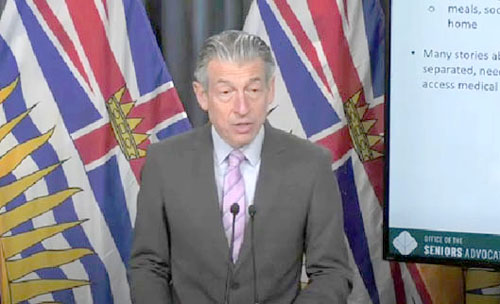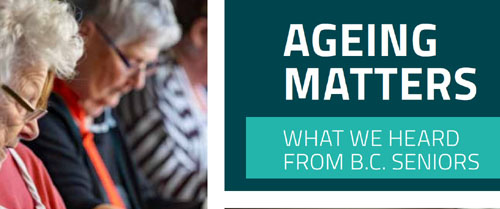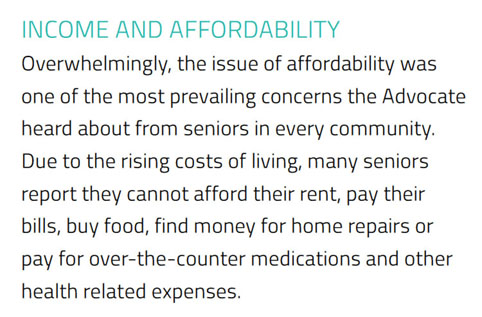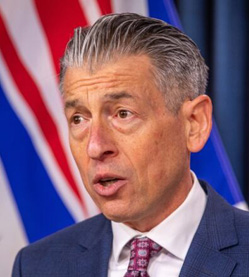Friday June 7, 2024 | VICTORIA, BC [Updated 1 pm]
Socioeconomic commentary by Mary P Brooke | Island Social Trends
BC Seniors Week runs June 2 to 8, 2024. This has been a week to recognize solder people and their needs.
Of course it’s a time when government and leadership across various sectors can weigh in on matters to do with a rapidly aging population.

Earlier this week, BC Seniors Advocate Dan Levitt released a statement on BC Seniors Week and then on Wednesday Levitt released his first report called Ageing Matters – What We Heard from BC Seniors.
The Parliamentary Secretary for Seniors’ Services and Long-Term Care, Harwinder Sandhu. also released a statement.

In April, Dan Levitt started actively touring the province to speak to seniors and the various non-profits and other groups that support older residents of our province.
All of that was generally low key for most British Columbians, as paying attention to the needs of seniors has not yet really risen to the level of urgency that the situation requires.
Embracing aging:
Levitt talks about embracing aging. That means “owning our age” and “being proud of the birth year” and grey hair, Levitt told Island Social Trends in a feature interview back in April. To embrace whatever “decade we are in” will depend on healthy aging, he pointed out.
He explores “internalized ageism”, i.e. “looking in the mirror and seeing what we don’t want to be”. That creates “a fear of aging, a fear of old people” which legitimately includes a natural fear of age-related illnesses and loneliness.
Ageism impacts social policy, says Levitt. That stance makes society less willing to put resources toward and build things like long-term care and social supports and housing for seniors.
Government should reexamine the subsidies for seniors on low income.
There are one million seniors in BC but Levitt looks to the other four million people in BC who are not seniors yet.
“If they live long enough they will be in that demographic eventually. How do we get their attention and get them to embrace aging. They all know a seniors and it matters deeply to their family members and their friends who are older,” Levitt told Island Social Trends.
“If we can connect the dots and if we have everyone caring about older people we will have made a big impact,” says Levitt.
How and where people live:
Levitt points out that multi-generational family living is not necessarily for everyone. The BC model of independent living speaks to the way many folks still want to live in this province and country.
He points out that an increasing number of seniors are single (about one in four) who “might want companionship but don’t necessarily want to live with somebody”.
“Housing for seniors needs to be in the centre of town where their family and friends live,” says Levitt.
Affordable seniors housing:
BC Housing continues to announce affordable housing projects that are targeted at the seniors population. While essential and welcome in communities those buildings are a costly option that takes time to roll out.
Levitt points out that housing types are important. He highlights how multi-storey townhomes with stairs, for example, are unsuitable for an aging population. Decisions by builders and developers (and their financial backers) play a role in the housing outcomes that are potentially available to seniors.
The BC Seniors Advocate specifies the type of “extra reinforcements” that houses and townhomes need for an aging population (e.g. elevator, wheelchair, bathrooms for grab bars, kitchen counter heights, and door widths). “We need to make sure the homes we are building are accessible,” says Levitt.
“Do both,” says Levitt, with a long-range view to where housing starts and to where it leads. Start by making housing more affordable for young people to get their first home and get into the market. He also points out about seniors who are are house-rich but cash-poor.
“Many people are still renting,” the BC Seniors Advocate says. One in five seniors rent. On that point he says the Shelter Aid for Elderly Renters (SAFER) program needs further expansion, beyond what was announced about SAFER in April 2024.
What did you do for BC Seniors Week?
Time flies. People have busy lives. What did you do for BC Seniors Week?
Did you think more about the challenges for seniors in our province? Did you visit a senior, help out with some of their everyday needs, maybe take an older parent or neighbour out for lunch?
Sometimes the time spent with people is as important as the activity or any specific hands-on support might be. Other supports include transportation or sharing a meal.
In a culture focused on the energetic aspects of youth and the excitement of adventure, it can be hard to pause and see how some simple adventures can be found quite close to home.
Social-emotional well being is important for maintaining overall health. Splitting off older parents and grandparents from their young families can have negative health impacts.
More seniors in the population:
Levitt points out that in 12 years (by 2036) that 25% of the BC population will be over age 65. Many people are now working for income past 65 due to the affordability crisis in this province.
Many people over 65 are now also volunteering to support fellow seniors — maybe because they have some time for that but also because societal and health-care system supports are broadly insufficient.
The average life span for British Columbians sees many people reaching their 90s or even beyond 100 years of age. But once people reach age 85 there is usually a need for significantly more support, as pointed out by Levitt this week.
Health ministry approach:
The thrust of BC Health Minister Adrian Dix and also the new seniors advocate is for people to live independently as long as possible.
The phrase coined long ago for this is ‘aging in place’. Dix has spoken often about the availability of home care, but only the lowest-income seniors are covered for those services and the services are not broadly or reliably available across all communities.
There is an economic incentive to support seniors at home. The longer it takes for seniors to require live-in long-term care, the less costly it is for the provincial budget. Meanwhile it’s generally healthier if not happier for most older folks to still live at home in their communities.
While the former long-time seniors advocate Isobel Mackenzie focused quite a bit on conditions in long-term care and assisted living (as well as pointing out the benefits of aging in place), the new seniors advocate Dan Levitt is gunning hard on the concept of ’embracing aging’ and all the benefits available for the seniors themselves as well as the health-care system and society more broadly. Levitt hopes to see older residents enjoy their own homes or non-institutionalized living arrangements for as long as possible.
Affordability challenge:
Many seniors worked their entire lives but their pension or other incomes are not enough to meet their basic needs.
Many service providers told Levitt during his tour around the province that the rising cost of living has placed significant pressures on seniors themselves as well as on service provider organizations to stretch their funding to support seniors in their communities.
Half of BC seniors have incomes that are less than half of the incomes of the working age population.
For those who worked all their lives but still don’t have enough for their older years: “It’s really dire straits for people unless we change the narrative, change the way we’re building an creating our communities, and making sure there’s a seniors residence that’s affordable, in every community,” says Levitt.
Cross-ministry challenge:
In the Island Social Trends with Levitt back on April 25, we asked about the challenge of cross-ministry results for seniors.
“While there are successes in some areas of seniors care, there are clearly some unmet needs,” said Levitt in his report this week.
One of those unmet needs has to do with seniors not knowing where to go for support or even where to start. He says supports and programs for seniors are “fragmented and uncoordinated, spread across several government ministries, health authorities and service providers”.
Five recommendations:
This week the BC Seniors Advocate’s first report — Ageing Matters – What We Heard from BC Seniors — boldly states: “We all share a responsibility in shaping how seniors live and age in BC.”
The report included five recommendations for government:
- Redesign the SAFER program (so that seniors pay 30% or less of their income on rent).
- Increase the amount of BC Seniors Supplement (currently capped at $99.30 per month)
- Eliminate the daily rate charge for home support (reduce premature transition to long-term care).
- Provide the shingles vaccine at no cost to BC seniors (National Advisory Committee on Immunization recommends people age 50+ receive it)
- Develop and implement a cross-ministry seniors services strategy and action plan (led by Health Ministry, but also Housing)
The report boldly states: “We all share a responsibility in shaping how seniors live and age in BC.”
===== RELATED:
- BC Seniors advocate sets directions about aging (June 5, 2024)
- BC Green Adam Olsen on the plight of renters (April 10, 2024)
- New rental supports for BC Seniors announced by Housing Minister (April 9, 2024)
- Rental support for seniors needs an overhaul, and fast (March 17, 2024)
- Rethink and embrace aging says new BC Seniors Advocate (January 26, 2024)
BC Seniors Advocate statement on Seniors’ Week 2024
by Dan Levitt, BC Seniors Advocate – VICTORIA [June 2, 2024] – “Since becoming B.C.’s second Seniors Advocate in March, I’ve been travelling throughout the province and had the privilege of meeting with hundreds of seniors in both rural and urban communities. I’ve been amazed at the amount of volunteerism and support seniors provide for other seniors.
“Whether it’s cooking and delivering meals, driving to appointments, helping around the house, providing companionship and conversation, or keeping seniors’ centres operating, older British Columbians are stepping up to care for each other.
“Ageing with dignity for many people means remaining independent and autonomous for as long as possible. British Columbians are living longer, healthier lives. While the commitment seniors have for each other and their communities is commendable, we must do more to make sure they can all access the programs, services and supports needed to stay safe and healthy as they age.
“Too many seniors are challenged to find affordable housing; manage the rising cost of living on fixed incomes; adapt their homes or pay increasing property taxes; or access publicly-subsidized home support services, local long-term care or assisted living in a timely manner. These supports and services are essential for a good quality of life for seniors both today, and in the future.
“More British Columbians will be seniors within the next decade than at any other time in our history. We must act now to meet the demands of a growing seniors’ population and ensure older people have the supports they need to thrive in their communities.
“With any luck, we will all be seniors one day. Let’s take a moment during Seniors’ Week this week to recognize their contributions, celebrate their achievements, and do all we can to help them live happy, healthy lives.”
Parliamentary secretary’s statement on B.C. Seniors’ Week
Issued by the Ministry of Health – VICTORIA [June 3, 2024] – Harwinder Sandhu, Parliamentary Secretary for Seniors’ Services and Long-Term Care, has issued the following statement in recognition of B.C. Seniors’ Week, June 2-8, 2024:
“B.C. Seniors’ Week is a time to recognize the vital role that seniors play in our communities and honour their wisdom. Through cultural teachings and traditions, volunteer initiatives, caregiving and dedication to their families, seniors shape our society every day.
“Not only have seniors built the communities we are fortunate to call home, but they continue to dedicate their time to actively supporting our province. Seniors contribute greatly to improving and nurturing community morale, making a lasting impact for future generations.
“Almost 24% of adults in B.C. are 65 years or older, and by 2025, it is expected that B.C. will be home to 1.2 million seniors. We are committed to ensuring that B.C.’s seniors have a government that values their contributions and prioritizes their needs.
“Our government has invested over $3.5 billion since 2018-19 to expand and improve quality care for seniors in B.C., including investments in primary care, home health, long-term care and assisted living. Since 2017, we’ve announced 17 new or expanded long-term care homes, with many more exciting announcements to come.
“We also know seniors want to live independently for as long as safely possible and recognize the importance of providing seniors living in B.C. with social services that support their health and well-being, helping them to get the care they need within their own homes.
“We are investing $127 million to expand and evolve community-based programs, such as Better at Home, the Therapeutic Activation Program for Seniors (TAPS) and the Family and Friend Caregiver Support program. These programs help improve the quality of seniors’ lives through access to services, such as grocery shopping, transportation, peer support, and recreational and educational programming, as well as providing coaching, counselling and education to their family and friend caregivers to enhance their caregivers’ skills and foster a sense of confidence and well-being in their caregiving roles.
“Through age-friendly grants, affordable food and transportation initiatives, we are helping local governments and Indigenous communities throughout the province become more accessible, safe and inclusive for seniors. We look forward to further engagement with seniors, seniors’ advocates and community groups, so we can continue providing the best care and support possible.
“Some of the direct actions we’ve taken to help seniors with the rising costs of living include doubling B.C.’s Senior’s Supplement, introducing a new low-income renter’s tax credit of $400, improvement to the Shelter Aid for Elderly Renters program, which included a one-time rental benefit of $430 and a historic $200 million invested in food security initiatives.
“We want to ensure that seniors, their families and friends have access to information on services available within our province. The B.C. Seniors’ Guide provides information on resources in B.C., which can help seniors lead safe, healthy and involved lives. This tool is available in nine languages reflecting the diversity of our province, including French, Chinese, Punjabi, Vietnamese, Korean, Farsi, Hindi and Tagalog.
“Our government is continuing to improve support for seniors whether they live at home, in assisted living or long-term care, so that they can live healthy and fulfilling lives in their communities and close to their loved ones.
“This week, let us take a moment to celebrate the seniors in our communities and all that they have done to enrich our lives. Thank you all for your inspiring contributions.”


















